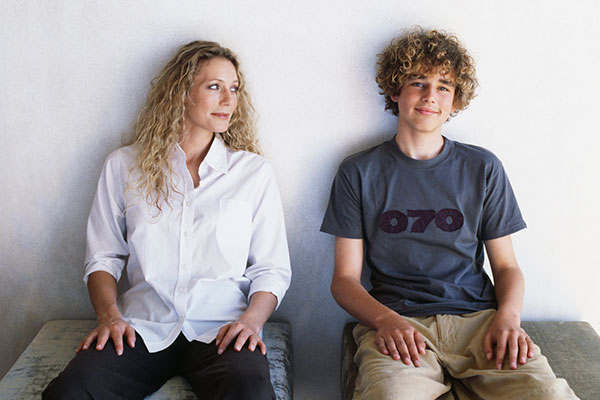When should you talk to your kids about investing?
New ii research uncovers some eye-catching data about how and when parents discuss Junior ISAs with their offspring, and the ways kids interact with their inherited savings at age 18.
11th April 2024 09:43
by Craig Rickman from interactive investor

Do you remember when you first started to get to grips with the world of investing?
I can, and it’s a fairly vivid memory. It happened in the mid-2000s when I cracked open the study materials for a financial adviser qualification and read for the first two dozen or so pages.
The first module covered broad financial matters such as tax, investments, and pensions, plus some regulatory stuff – topics I had little to no prior knowledge of.
Invest with ii: Open a Junior ISA | Transferring a Junior ISA | The Junior ISA Annual Allowance
Needless to say, the initial weeks of learning involved lots of head scratching and internal debate about whether I’d chosen a suitable career path. Even what industry stalwarts would consider straightforward saving and investing principles I found dizzying. “What on earth is an OEIC?” and “How does upfront pension tax relief work?” were two memorable things I struggled to get my brain around.
Two decades have since passed, and despite swapping financial advice for journalism in 2015, my feet have remained firmly in the personal finance sector throughout this time. By default, my knowledge has dramatically improved.
But I often think back to this experience to appreciate the challenges facing current and future waves of fledging investors. The sector is steadily doing a good job of helping this group make good decisions with their wealth. The main message is to keep things simple. And as experienced investors will know, this is sage guidance.
The problem here is that understanding the simple stuff often requires some comprehension of the knottier parts.
Despite the ongoing push to fully roll out financial education in schools, the prospect still seems distant. There are some obstacles to overcome, not least for teachers themselves to develop the financial nous to deliver the subject to a good standard.
In the meantime, young adults up and down the country are inheriting decent-sized investment portfolios at age 18 and have taken the driving wheel to manage the money themselves.
- Should I use a Junior ISA or my own allowance when saving for my kids?
- ISA ideas: funds and trusts for young, middle-aged and retired investors
So, what am I referring to here? Well, it concerns Junior individual savings accounts (JISA); the under-18 version of the standard ISA. As a brief outline of the mechanics, parents can invest £9,000 a year into the tax wrapper, which comes with two sub-types: cash, and stocks and shares. The former is more popular, but the investment version is increasingly gaining traction.
Since the product was launched in 2011, parents - and to some extent grandparents - have generously shovelled surplus savings and income into the tax wrapper to give their offspring a welcome financial leg-up on reaching adulthood.
Kids inheriting investment portfolios at age 18 isn’t new territory. The product’s predecessor, the child trust fund, worked in a similar way.
While child trust funds proved popular, the traction gained by JISAs is particularly eye catching. In the 2021-22 tax year, there were 1.2 million JISA subscriptions (475,000 into the stocks and shares type), with an average contribution of around £1,200. This vaulted the market to around £9 billion, tripling its value in just four years.
What sort of sums are children netting?
We recently did some digging and found that the average maturity value for a stocks and shares JISA on the interactive investor platform is £20,202. I’m sure most will agree this sum provides a cracking start to adult life, helping to navigate the wave of financial challenges that soon will emerge for this cohort.
But a healthy investment pot comes with an equally healthy dose of responsibility. Junior ISAs transfer into an adult version in the child’s name at age 18, with the task of managing the investments shifting from parent to child. In terms of what investments parents choose, 41% is in funds, 17% in single shares, with 16% and 15% in investment trusts and exchange-traded funds (ETFs), respectively.
This begs two questions: are JISA heirs aware of what their nest egg is invested in, notably that the money can potentially rise and fall sharply? And if not, do they really need to?
Let’s try to answer these.
The role of parents in investing education
Having important conversations with your kids is par for the course of parenthood. Some subjects can indeed be uncomfortable; I’m thinking the dreaded “birds and the bees”, although schools take on the grunt work here - and for many mums and dads, thankfully so.
Conversely, as I’ve already mentioned, financial education is still rare, despite entering the curriculum in secondary schools in 2014. That said, it would be naive to suggest this alone will provide the solution.
To find out more about how parents approach the topic of JISAs with their children, we ran another poll. Here’s what the results told us.
Almost a third of parents (30%) say they haven’t told, or plan to tell, their child before they’re 18. This prompts the question why. “They’re too young” was the most common response, given by over two-fifths (44%) of respondents. Around one in four (26%) said they don’t know why they haven’t told their child about their JISA.
- The funds pros have personally invested in for Junior ISAs
- Make sure your kids aren’t jeopardising your retirement
One well-documented worry is that kids knowing about their JISA could do more harm than good. Thinking is, if they were aware they could withdraw funds from age 18 it would increase the risk of the proceeds being encashed and squandered. And while these fears might be overblown, they were shared by almost 13% of parents yet to tell their children.
Elsewhere, 12% deemed it inappropriate, while 5% said they think their child finds matters related to money and finance boring. In fairness, I might’ve felt the same when I was in my early teens. And attempting to engage those who aren’t interested can be a thankless task.
But for those who have broached the subject or are thinking about it, what is an appropriate age? The largest percentage of the sample (36%) reckon between 10 and 15, while one in four (25%) said children shouldn’t know about them until they turn 18 and the same number cited age 16-17.
How much knowledge do JISA holders need?
Just how important is it that children have a basic introduction to their JISA and investing more generally by the time they reach 18? I would argue that while it would be helpful, it’s not essential.
That’s because parents who have cared enough to give their children a healthy nest egg will not simply leave them to their own devices.
By the law of averages, some kids will be keen and self-educated enough to manage the money themselves, but many parents will continue to guide them for several years.

What JISA holders do with investments at 18
With this in mind, how do JISA holders interact with their savings once the money is transferred into their own name?
Well, we found that almost four in 10 with maturing JISAs invested more than they withdrew within the first month, adding £1,193 on average, net of any withdrawals made.
This counters the concern that children might recklessly waste the cash the second they can get their hands on it.
And this is further illustrated by investor behaviour over the first 12 months. Interestingly, almost half (46%) topped up their ISA by an average of £7,012– again net of withdrawals.
- How to make your child a pension millionaire
- Helping your child buy their first home? Make sure you do it tax-effectively
We can only speculate where this extra funding has come from. My guess would be further support from older generations, and those who have taken a student loan for university but don’t need to spend it.
But as you may expect, it’s not all one-way traffic; a similar number accessed their investments. Some 42% made withdrawals (net of contributions) averaging £6,728 – which might have been used to fund university costs, a gap year or car purchase.
Why parental wisdom remains key
Younger generations are taking a keener interest in investing than in years gone by, largely thanks to social media. The growth of “finfluencers” on platforms such as Instagram and TikTok is swelling. However, this might not necessarily be a good thing. There are concerns about the quality of the guidance being dished out, notably from regulators who are seeking to clamp down on harmful practices.
I’m sure few parents are comfortable with their children relying on social media for money and investing tips. Therefore, elders with any kind of skin in the investing game may still be best placed to start the education process. At what age they feel this is appropriate, whether before or after their child inherits an ISA portfolio, is ultimately their call.
At ii, we recognise the role we can play here, too. That’s why we’ll be launching a novice investor mini-series over the coming weeks, with hints and tips on how to kickstart an investment journey with confidence.
*The surveyed was completed by 500 parents who visited the interactive investor website between 4 and 7 March.
These articles are provided for information purposes only. Occasionally, an opinion about whether to buy or sell a specific investment may be provided by third parties. The content is not intended to be a personal recommendation to buy or sell any financial instrument or product, or to adopt any investment strategy as it is not provided based on an assessment of your investing knowledge and experience, your financial situation or your investment objectives. The value of your investments, and the income derived from them, may go down as well as up. You may not get back all the money that you invest. The investments referred to in this article may not be suitable for all investors, and if in doubt, an investor should seek advice from a qualified investment adviser.
Full performance can be found on the company or index summary page on the interactive investor website. Simply click on the company's or index name highlighted in the article.
Important information: Please remember, investment values can go up or down and you could get back less than you invest. If you’re in any doubt about the suitability of a Stocks & Shares ISA, you should seek independent financial advice. The tax treatment of this product depends on your individual circumstances and may change in future. If you are uncertain about the tax treatment of the product you should contact HMRC or seek independent tax advice.